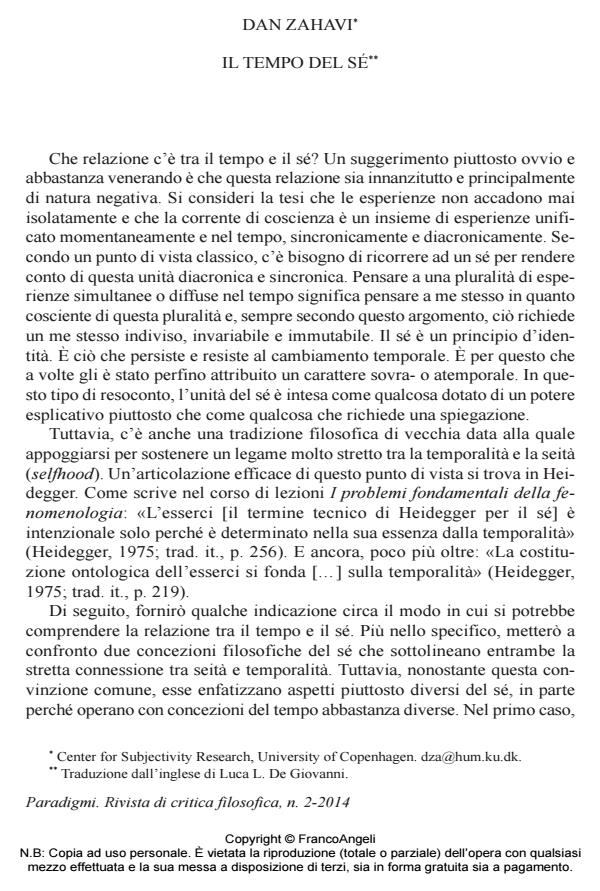The Time of the Self
Journal title PARADIGMI
Author/s Dan Zahavi
Publishing Year 2014 Issue 2014/2 Language Italian
Pages 18 P. 31-48 File size 176 KB
DOI 10.3280/PARA2014-002003
DOI is like a bar code for intellectual property: to have more infomation
click here
Below, you can see the article first page
If you want to buy this article in PDF format, you can do it, following the instructions to buy download credits

FrancoAngeli is member of Publishers International Linking Association, Inc (PILA), a not-for-profit association which run the CrossRef service enabling links to and from online scholarly content.
This essay tries to investigate the relationship bewteen time and the Self by contrasting two different ways of thinking this relationship, which they both assume as constitutive for the Self. The first one is the narrative account of the self, the second one is the experiencial or phenomenological account of the self. The narrative account stresses the importance of narrated time, and therefore of authorship in the constitution of the identity of the Self. On the contrary, the experiencial approach focuses on the time structure of our own stream of consciousness, and therefore emphasizes the ownership of lived experience, i.e. the first-person perspective of our own lived experience. After having argued that no account of the Self can ignore the basic temporal structure of experience and that for this reason the experiencial approach is the most fundamental, in the conclusions the author suggests that this view alone is incapable of giving a complete account of the identity of the self, especially when it comes to human selfhood. As a consequence, the experiencial approach should be integrated with the narrative approach.
Keywords: Time, selfhood, identity, narrative, inner time-consciousness.
- Atkins K. (2004). Narrative identity, practical identity and ethical subjectivity. Continental Philosophy Review, 37: 341-366. DOI: 10.1007/s11007-004-5559-
- Dainton B. (2000). Stream of consciousness: unity and continuity in conscious experience. London: Routledge.
- Dainton B. (2008). The Phenomenal Self. Oxford: Oxford University Press. DOI: 10.1093/acprof:oso/9780199288847.001.000
- Dilthey W. (2004). Scritti filosofici. Torino: UTET. Dreyfus G. (2011). Self and Subjectivity: A Middle Way Approach. In: Siderits M.,
- Thompson E., Zahavi D., eds. Self, No Self? Perspectives from Analytical, Phenomenological, and Indian Traditions. Oxford: Oxford University Press: 114-156.
- Frankfurt H. (1988). The Importance of What We Care About: Philosophical Essays. Cambridge: Cambridge University Press.
- Heidegger M. (1975). Die Grundprobleme der Phänomenologie. Frankfurt: Klostermann (trad. it.: I problemi fondamentali della fenomenologia. Genova: Il Nuovo Melangolo, 1998).
- Husserl E. (1962). Phänomenologische Psychologie, Husserliana IX. Den Haag: Martinus Nijhoff.
- Husserl E. (1966). Zur Phänomenologie des inneren Zeitbewußtseins (1893-1917),
- Husserliana X. Den Haag: Martinus Nijhoff (trad. it.: Per la fenomenologia della coscienza interna del tempo (1893-1917). Milano: Franco Angeli, 2004).
- Husserl E. (1984). Logische Untersuchungen II. Untersuchungen zur Phänomenologie und Theorie der Erkenntnis, Husserliana XIX. Den Haag: Martinus Nijhoff. (Trad. it.: Ricerche logiche. Vol. 2. Milano: Il Saggiatore, 2005).
- Jopling A. (2000). Self-knowledge and the self. London: Routledge.
- Korsgaard C.M. (2009). Self-Constitution: Agency, Identity, and Integrity. Oxford: Oxford University Press. DOI: 10.1093/acprof:oso/9780199552795.001.000
- MacIntyre A. (1981). After virtue: A study in moral theory. London: Duckworth. (Trad. it.: Dopo la virtù. Saggio di teoria morale. Roma: Armando Editore, 2007).
- Merleau-Ponty M. (1945). Phénoménologie de la perception. Paris: Éditions Gallimard. (Trad. it.: Fenomenologia della percezione. Milano: Bompiani, 2003).
- Ricoeur P. (1985), Temps et récit III: Le temps raconté. Paris: Éditions du Seuil. (Trad. it.: Tempo e racconto. Vol. 3. Il tempo raccontato. Milano: Jaca Book, 2007).
- Sartre J.-P. (1936). La transcendance de l’ego. Paris: Vrin. (Trad. it.: La trascendenza dell’Ego. Milano: Marinotti, 2011).
- Schechtman M. (2006). Stories, lives and basic survival: A refinement and defense of the narrative view. In: Hutto D.D., ed. Narrative and Understanding Persons. Cambridge: Cambridge University Press: 155-178.
- Searle J.R. (2005). The Self as a problem in philosophy and neurobiology. In: Feinberg T.E., Keenan J.P., eds. The Lost Self: Pathologies of Brain and Identity. Oxford: Oxford University Press: 7-19.
- Tomasello M. (2008). Origins of Human Communication. Cambridge, MA.: MIT Press.
- Zahavi D. (1999). Self-awareness and Alterity: A phenomenological investigation. Evanston: Northwestern University Press.
- Zahavi D. (2003). Inner Time-consciousness and Pre-reflective Self-awareness. In: Welton D., ed. The New Husserl: A Critical Reader. Bloomington: Indiana University Press: 157-180.
- Zahavi D. (2005). Subjectivity and Selfhood: Investigating the First-Person Perspective. Cambridge, MA: MIT Press.
- Zahavi D. (2007). Perception of Duration Presupposes Duration of Perception or Does it? Husserl and Dainton on Time. International Journal of PhilosophicalStudies 15/3: 453-471. DOI: 10.1080/0967255070144546
- Zahavi D. (2009). Is the Self a Social Construct?. Inquiry 52/6: 551-573. DOI: 10.1080/0020174090337782
- Zahavi D. (2010). Minimal Self and Narrative Self: A Distinction in Need of Refinement. In: Fuchs T., Sattel H.C. & Henningsen P., eds. The Embodied Self: Dimensions, Coherence and Disorders. Stuttgart: Schattauer: 3-11.
- Zahavi D. (2011). The Experiential Self: Objections and Clarifications. In: Siderits
- M., Thompson E., Zahavi D., eds. Self, No Self? Perspectives from Analytical, Phenomenological, and Indian Traditions. Oxford: Oxford University Press: 56-78.
Dan Zahavi, Il tempo del sé in "PARADIGMI" 2/2014, pp 31-48, DOI: 10.3280/PARA2014-002003